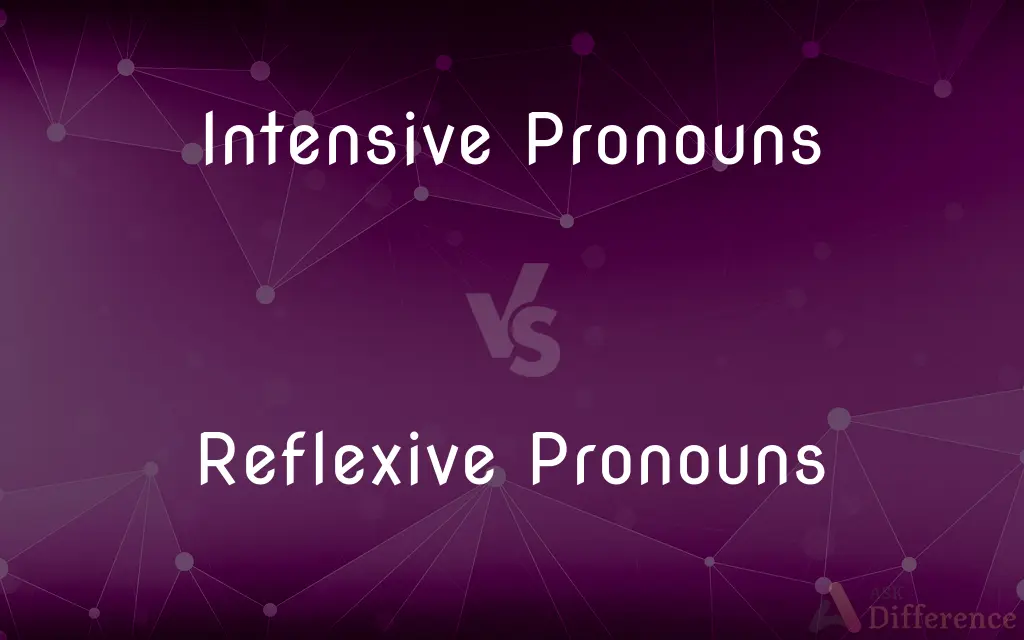Intensive Pronouns vs. Reflexive Pronouns — What's the Difference?
By Tayyaba Rehman — Published on January 16, 2024
Intensive pronouns emphasize the subject, while reflexive pronouns indicate the subject performs an action on itself.

Difference Between Intensive Pronouns and Reflexive Pronouns
Table of Contents
ADVERTISEMENT
Key Differences
Intensive pronouns are used to emphasize a noun or another pronoun. They are not essential to the sentence's structure; their removal doesn’t alter the sentence’s fundamental meaning but diminishes its emphasis.
Reflexive pronouns are used when the subject of the sentence is also the object of the action. They are crucial to the sentence because they indicate that the action of the verb is performed on the subject itself.
Intensive pronouns are often placed immediately after the noun or pronoun they are emphasizing. They add stylistic force to a noun or pronoun, suggesting a strong emphasis or intensification.
Reflexive pronouns are positioned after the verb and are necessary to the meaning of the sentence. They show that the action of the sentence reflects back upon the subject.
The use of an intensive pronoun is optional and is used for providing additional emphasis that the subject of the sentence is acting. Without it, the sentence still stands grammatically correct.
ADVERTISEMENT
A reflexive pronoun is required for the sentence to make sense. If it's removed, the sentence could convey an unintended meaning or become grammatically incorrect.
Comparison Chart
Function
Adds emphasis to the subject or another pronoun
Shows that the subject performs an action on itself
Grammatical Necessity
Optional; can be removed without losing grammatical correctness
Necessary; cannot be removed without altering sentence meaning
Placement in Sentence
Usually close to the noun or pronoun they emphasize
Follows the verb and relates to the subject
Effect on Sentence Meaning
Does not change the action of the verb
Essential for conveying the correct action of the verb
Example
"I myself couldn't believe it."
"I dressed myself."
Compare with Definitions
Intensive Pronouns
Used for emphasis.
The president himself attended the meeting.
Reflexive Pronouns
Subject is also the direct object.
She taught herself to play the piano.
Intensive Pronouns
Reinforces who is performing the action.
You must do it yourself to understand.
Reflexive Pronouns
Necessary for sentence clarity.
The cat groomed itself.
Intensive Pronouns
Can be removed without altering meaning.
She cooked the entire meal herself.
Reflexive Pronouns
Indicates the subject's direct involvement in the action.
I introduced myself to the new manager.
Intensive Pronouns
Immediately follows the noun it emphasizes.
The CEO herself approved the policy.
Reflexive Pronouns
Follows the verb.
He prepared himself for the journey.
Intensive Pronouns
Does not receive the action of the verb.
I will do it myself.
Reflexive Pronouns
The action of the verb reflects on the subject.
They availed themselves of the offer.
Common Curiosities
Why are reflexive pronouns used?
To indicate that the subject of the verb is performing the action on itself.
Are intensive pronouns necessary for a sentence?
No, they're not necessary and can be removed without changing the sentence’s fundamental meaning.
Can an intensive pronoun be used in place of a reflexive pronoun?
No, because they serve different grammatical purposes.
What happens if you remove a reflexive pronoun from a sentence?
The sentence might not make sense or could change in meaning.
What is an intensive pronoun?
An intensive pronoun emphasizes the preceding noun or pronoun.
What are common reflexive pronouns?
Myself, yourself, himself, herself, itself, ourselves, yourselves, themselves.
Can you give me an example of a reflexive pronoun?
Yes, "herself" in "She found herself lost in the city" is reflexive.
Can intensive pronouns be placed anywhere in a sentence?
No, they are most effective and grammatically correct when placed near the noun or pronoun they emphasize.
How do you identify an intensive pronoun in a sentence?
It will be next to the noun or pronoun it's emphasizing and removable without grammatical consequence.
Can a pronoun be both intensive and reflexive?
Yes, depending on how it's used in a sentence.
Are reflexive pronouns always necessary?
Yes, if the meaning that the subject is performing the action on itself is to be clear.
What is the difference in the placement of reflexive and intensive pronouns?
Reflexive pronouns follow a verb, while intensive pronouns typically follow the noun or pronoun they emphasize.
What are common intensive pronouns?
myself, yourself, himself, herself, itself, ourselves, yourselves, themselves, used for emphasis.
Do intensive pronouns change the action of the verb?
No, they only add emphasis and do not affect the verb's action.
Do reflexive pronouns ever appear at the start of a sentence?
No, they typically follow the verb they relate to.
Share Your Discovery

Previous Comparison
Clarified Butter vs. Ghee
Next Comparison
Introns vs. ExonsAuthor Spotlight
Written by
Tayyaba RehmanTayyaba Rehman is a distinguished writer, currently serving as a primary contributor to askdifference.com. As a researcher in semantics and etymology, Tayyaba's passion for the complexity of languages and their distinctions has found a perfect home on the platform. Tayyaba delves into the intricacies of language, distinguishing between commonly confused words and phrases, thereby providing clarity for readers worldwide.














































